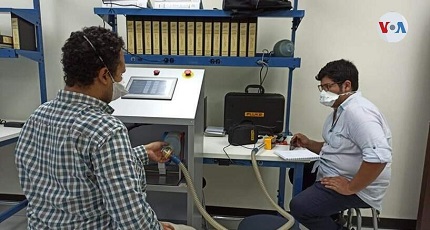The battle against the Coronavirus pandemic in El Salvador has in its front line two very important allies: the country's national research and education network (NREN), RAICES, and the Francisco Gavidia University (UFG), which, with the support and broadband offered by the advanced network, developed some actions to strengthen the fight against COVID-19.
The first one was the development of an automated mechanical respirator to support hospitals in emergency care. It is a piece of equipment whose prototype, created by the Nanotechnology Laboratory of the UFG, works with an engine and, with elements made with a 3D printer, presses a respiratory aid manual pump used in emergency areas.
According to the director of the UFG Institute of Science, Technology and Innovation, Óscar Picardo, the expectation is that once the prototype is completed, it will comply with all the conditions and requirements of the FDA (US Food and Drug Administration). It would allow the production on a pre-industrial scale of five or 10 more pieces of equipment.
“If everything works well, it may be that in the future it will develop commercially, with large-scale production through a company that is interested in the project. Although, we are a university; we are not dedicated to either the commercial or the productive part”, explained Picardo. The academic also said that the university intends to develop a more “complex” respirator, such as those used in intensive care units.
Public policy proposals
Another action by UFG was the development of a public policy plan to amortize the impact of COVID in other areas, such as the economy. Named "Health, economics and mathematical models: an approach to COVID-19 in El Salvador and public policy proposals", the report presents data, questions and perspectives on the relationship between economy and health after the COVID-19 pandemic and its development in El Salvador; with the help of the SIR / SEIR mathematical model, Python projections were made to predict the development of the pandemic and thus design policies, measures and programs to deal with the crisis.
The team that was responsible for the report is composed by Helga Cuéllar-Marchelli, PhD and director of the Department of Social Studies of the Salvadoran Foundation for Economic and Social Development (FUSADES), Óscar Picardo, Javier Cladellas, of the "Carlos Castillo Chávez” Mathematical Modeling Center, from UFG, James Humberstone, engineer from the same center, Óscar Luna, editorial director of Disruptiva.media, and Roberto J. Vidrí, clinical instructor at the School of Medicine at Tufts University, in the United States.
Among the conclusions, the study points out that, in order to expand the capacity of the public health system, minimize economic impacts and face the COVID-19 pandemic, it is important to involve companies, universities and other institutions that can contribute with valuable knowledge and resources, which reinforces the importance the work of RAICES and UFG at this moment.
"Health, economics and mathematical models: an approach to COVID-19 in El Salvador and public policy proposals", is available for consultation and download at http://observatoriocovid19.sv/epidemiologia.html
For more information about UFG's work, please visit http://www.ufg.edu.sv/
For more information about RAICES, please visit http://www.raices.org.sv/





